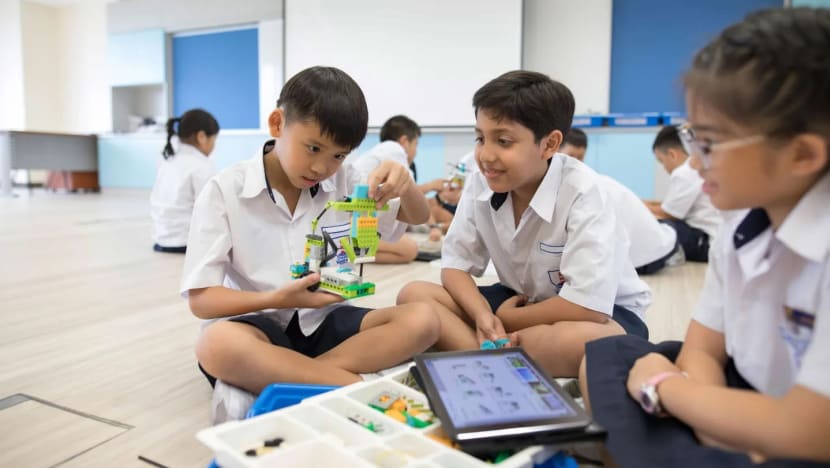New high-ability programmes not designed to help students perform better in exams: Chan Chun Sing
They are also not meant to introduce higher subject levels ahead of time, said the education minister, addressing the revamped gifted programme announced in August.

Primary school students. (File photo: Facebook/Chan Chun Sing)

This audio is generated by an AI tool.
SINGAPORE: The new school-based high-ability programmes are not designed to help students perform better in mainstream examinations, Minister for Education Chan Chun Sing said on Tuesday (Sep 10).
“Neither is the aim to introduce higher subject levels ahead of time, which would still be bounded by the core curriculum and examination requirements,” he added.
Responding to parliamentary questions about the recently announced overhaul of the Gifted Education Programme (GEP), Mr Chan said the programmes aim to cultivate curiosity, creativity and a love for learning in students.
As part of the revamp announced by Prime Minister Lawrence Wong in his maiden National Day Rally speech in August, school-based programmes for high-ability learners will be expanded to about 10 per cent of the primary school cohort.
Currently, 1 per cent of the cohort is selected for the GEP, studying at one of the nine primary schools that offer the programme from Primary 4. Another 7 per cent of the cohort is part of the school-based programmes for higher-ability learners.
The overhauled programme will be implemented from 2024’s Primary 1 cohort, the Ministry of Education (MOE) said in August.
It is timely to update Singapore’s approach on developing higher-ability learners, said Mr Chan.
Instead of a uniform programme for selected students based on their general abilities in multiple areas, the new model means opportunities can be offered to those with higher abilities in specific areas, he added.
Students can also join the high-ability programmes at any time in their upper primary years, instead of only through selection tests in Primary 3.
With the new approach, students can exit the programme or modules at any time if they find themselves unsuitable or want to pursue other interests, said the education minister.
They can leave the programmes without the stigma of having failed to meet expectations after being labelled as gifted, he added.
Responding to a supplementary question from Ms Denise Phua (PAP-Jalan Besar) about whether the labels for programmes or higher-ability students can be dropped entirely, Mr Chan said it would not be possible to run the classes on the basis of interest without an assessment of the students’ abilities.
“For all of us familiar with teaching and teaching pedagogies, we know that it is actually very tough to teach to the average, where you have a class of very diverse abilities from very high needs students to very high ability students,” he added.
Moving forward, MOE wants to cluster students at the same ability levels in the same domains for more effective teaching and learning, said the education minister.
Mr Louis Chua (WP-Sengkang) highlighted that the smaller class sizes of the GEP was a key feature, and asked whether those involved in the high-ability programmes would similarly see smaller class sizes.
Class size depends on the needs of the students, and “both ends of the spectrums” tend to have smaller class sizes, said Mr Chan in response.
The main determinant of the quality of an education system is not necessarily class sizes, but the quality of teachers and how they are supported to use the most effective tools for different types of classes, he added.
“We can’t change the average (class size) very much because in every society, there are only so many quality teachers that we can recruit. If we expand the numbers, we don’t want to compromise the quality,” said the education minister.
Students with higher needs have smaller class sizes to cater to their needs, but for classes with “not so high needs”, schools must leverage technologies to allow them to learn on their own and complement what teachers are doing, he added.
















